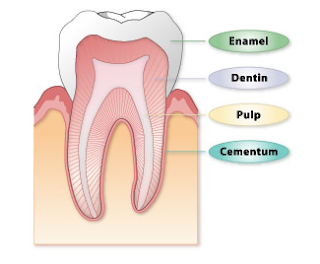Selecting A Toothbrush
A toothbrush is an important tool to keep your mouth clean. It's
important that you pick a toothbrush that's safe and easy to use. Pick one
that's the right size for your mouth and that you can comfortably handle and
make sure the bristles are not hard. Think about adding special features, like
a tongue cleaner or particular type of handle, if this will make you more
likely to use it. You should also make sure your toothbrush is safe. Make sure
it has a safety label on it prior to purchase.
Here are some guidelines for choosing
a toothbrush.
Based on past toothbrushes, you
should have some idea of the general shape of your mouth. Some mouths are more
narrow or wide than others, and you need a toothbrush that works for your mouth
and teeth. You want a brush that can comfortably reach the back of your molars.
The shape of your mouth, and whether it's wider or narrower, will affect how
easily a given brush can reach your molars.
Look at the angle of the
toothbrush.Some toothbrushes are designed to be
held at a particular angle. Some consumers find a slightly tilted toothbrush
allows them to more easily hit certain areas of the mouth. However, you should
not purchase a toothbrush you do not know how to use. Unless you have a strong
preference for an angled brush and have
used one before, opt for a standard toothbrush. The ideal toothbrush is always
one you can easily use.
Select a handle you like.
You're
less likely to brush your teeth effectively if you dislike your toothbrush's
handle. Go for a toothbrush with a soft handle that's easy to hold. If you
struggle to hold your toothbrush, you're likely to stop brushing your teeth
prematurely and also to use bad brushing technique, which can damage your
teeth.
Opt for softer bristles.
While
toothbrushes come in a variety of bristle strengths, you should usually opt for
softer bristles. This is less taxing on your gums and tooth enamel. Hard
bristles may cause gum tissue to pull back from teeth, which can expose the
tooth root and lead to increased sensitivity to heat, cold or certain foods and
drinks.
Pick out the extras you want.
Is
there a special feature you feel you'll use? If you're, say, preoccupied with
bad breath, you may want a toothbrush with a tongue cleaner. If you're
environmentally conscious, you may want a toothbrush that's easily recyclable
and made from organic materials.
A manual versus an electronic
toothbrush.
Manual toothbrushes are operated just
with your hands. Electronic toothbrushes have a motor that moves the bristles
for you as you move the toothbrush over your mouth. The main benefit of an
electronic toothbrush is it can give you a deeper clean. It's also great if you
have a condition like arthritis, as electronic toothbrushes do much of the work
for you. Electronic toothbrushes are usually expensive. Another major
disadvantage of having an electronic toothbrush is that you might forget how to
brush properly. The most effective brushing technique is still the manual one
where you can brush your teeth and gums using vertical strokes.



Comments
Post a Comment